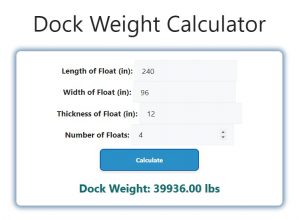About Dock Weight Calculator (Formula)
A dock weight calculator is an essential tool used to estimate the total weight of a dock structure based on its dimensions and other factors. Whether you’re designing a floating dock, constructing a fixed dock, or maintaining a structure along the water, knowing the dock’s weight is critical for safety, stability, and overall performance.
Formula
The formula to calculate dock weight (DW) is as follows:
Dock Weight (DW) = (L/12) * (W/12) * (T/12) * #F * 62.4
Where:
- L = Length of the dock (in inches)
- W = Width of the dock (in inches)
- T = Thickness of the dock (in inches)
- #F = Number of floatation units (if applicable)
- 62.4 = Weight of water per cubic foot (used for buoyancy calculation)
How to Use
- Measure the Dimensions: Take measurements of your dock’s length, width, and thickness in inches.
- Determine Floatation Units: If your dock has floatation units, count how many are used.
- Apply the Formula: Plug the values into the dock weight formula.
- Calculate the Weight: Multiply the factors, divide by 12 as needed, and then multiply by 62.4 to get the dock weight in pounds.
Example
Let’s assume you have a dock with the following measurements:
- Length (L) = 240 inches
- Width (W) = 96 inches
- Thickness (T) = 12 inches
- Floatation units (#F) = 4
Using the formula:
Dock Weight (DW) = (240/12) * (96/12) * (12/12) * 4 * 62.4
Dock Weight (DW) = 20 * 8 * 1 * 4 * 62.4
Dock Weight (DW) = 39,936 pounds

FAQs
- What is a dock weight calculator?
A dock weight calculator estimates the total weight of a dock based on its size and number of floatation units. - Why is knowing dock weight important?
Knowing dock weight is crucial for ensuring stability, selecting the right materials, and maintaining safe dock installation. - What are floatation units?
Floatation units are buoyant structures used to keep floating docks stable on the water. - Can this formula be used for both floating and fixed docks?
Yes, but for fixed docks, the floatation unit factor may be zero, while floating docks rely on this for accurate weight calculation. - How do you convert inches to feet in the formula?
The formula divides each dimension by 12 to convert inches to feet, ensuring the final weight is in pounds. - What is the significance of 62.4 in the formula?
The number 62.4 represents the weight of water per cubic foot, which is used to calculate buoyancy. - What if my dock has no floatation units?
If your dock has no floatation units, set the floatation factor (#F) to 1 in the formula. - How accurate is the dock weight calculator?
It provides a reliable estimate, though for professional purposes, further structural analysis may be needed. - Can I use metric units for this calculator?
No, the formula is designed for standard measurements. You’ll need to convert metric values to inches. - What materials affect dock weight?
Wood, concrete, and steel all affect the weight of a dock, but the calculator is primarily based on dimensions and floatation. - How often should I recalculate the dock weight?
If you add extensions or make significant modifications to your dock, you should recalculate the dock’s weight. - What happens if my dock is too heavy for the water?
A dock that’s too heavy may sink or become unstable, making it unsafe for use. - What should I do if my dock seems unstable?
Check your floatation units and verify the dock weight calculation. You may need to add more floatation to stabilize it. - Is this calculator useful for commercial docks?
Yes, but for commercial docks, it’s essential to consult with an engineer to ensure structural integrity. - Can this formula be used for calculating dock anchors?
No, this formula is specifically for dock weight, not for anchor or mooring calculations. - Can environmental factors like wind affect dock weight?
Environmental factors won’t affect dock weight but may impact overall stability, so consider them in your design. - Do I need to factor in tidal changes when using this calculator?
Tidal changes don’t affect dock weight but can influence how your dock interacts with water levels. - How can I increase the buoyancy of my floating dock?
You can add more floatation units to increase buoyancy, which will help support heavier docks. - Does the water type (saltwater or freshwater) impact the calculation?
Yes, the weight of water varies slightly between saltwater and freshwater, but 62.4 is a general constant used for most calculations. - How do I ensure my dock is balanced on the water?
Evenly distribute the floatation units and ensure the weight calculation is accurate to maintain balance.
Conclusion
A dock weight calculator is a useful tool for estimating the weight of both floating and fixed docks, helping ensure stability and safety. By using the simple formula, dock owners can maintain and build docks that are sturdy and reliable. Whether for personal or commercial use, understanding dock weight ensures long-term durability and performance.